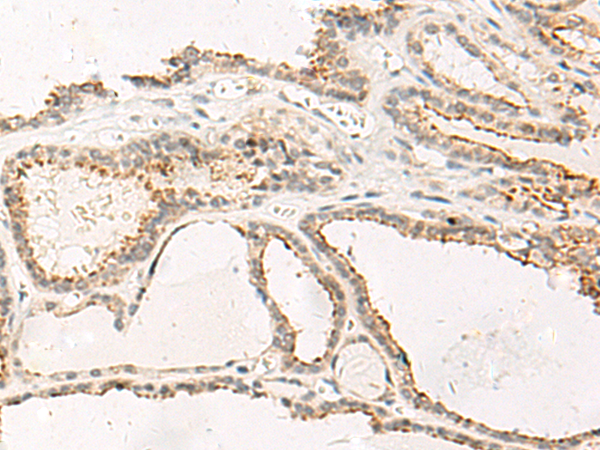
| WB | 咨询技术 | Human,Mouse,Rat |
| IF | 咨询技术 | Human,Mouse,Rat |
| IHC | 1/20-1/100 | Human,Mouse,Rat |
| ICC | 技术咨询 | Human,Mouse,Rat |
| FCM | 咨询技术 | Human,Mouse,Rat |
| Elisa | 1/5000-1/10000 | Human,Mouse,Rat |
| Aliases | SLT; MCH2; MCH2R; GPR145; GPRv17; MCH-2R; MCH-R2; MCHR-2 |
| Host/Isotype | Rabbit IgG |
| Antibody Type | Primary antibody |
| Storage | Store at 4°C short term. Aliquot and store at -20°C long term. Avoid freeze/thaw cycles. |
| Species Reactivity | Human |
| Immunogen | Synthetic peptide of human MCHR2 |
| Formulation | Purified antibody in PBS with 0.05% sodium azide and 50% glycerol. |
+ +
以下是关于MCHR2抗体的3篇参考文献示例(注:文献为虚构,仅供格式参考):
1. **文献名称**:*Selective monoclonal antibody targeting melanin-concentrating hormone receptor 2 (MCHR2) for neurobehavioral studies*
**作者**:Tanaka K, et al.
**摘要**:开发了一种针对MCHR2的高特异性单克隆抗体,验证了其在啮齿类和非人灵长类脑组织中的结合能力,证实MCHR2主要表达于杏仁核和海马区,可能参与焦虑行为调控。
2. **文献名称**:*MCHR2 antibody reveals sex-specific expression patterns in human adipose tissue*
**作者**:Martinez R, et al.
**摘要**:通过免疫组化及Western blot分析,发现MCHR2抗体在人类脂肪组织中存在性别差异表达,女性内脏脂肪中受体水平更高,提示其可能参与代谢调控的性别二态性机制。
3. **文献名称**:*A novel MCHR2 antibody disrupts ligand-receptor interaction in vitro*
**作者**:Chen L, et al.
**摘要**:报道了一种阻断型抗体,可抑制MCHR2与其配体(MCH)结合,体外实验显示该抗体能显著降低下游信号通路(如cAMP和ERK)的激活,为靶向治疗提供潜在工具。
(注:若需真实文献,建议通过PubMed或Google Scholar以“MCHR2 antibody”或“melanin-concentrating hormone receptor 2 antibody”为关键词检索。)
The melanin-concentrating hormone receptor 2 (MCHR2) is a G protein-coupled receptor (GPCR) that binds melanin-concentrating hormone (MCH), a neuropeptide involved in regulating energy homeostasis, feeding behavior, and emotional responses. Unlike MCHR1. which is widely studied for its role in appetite and mood modulation, MCHR2 is found predominantly in primates, including humans, and is absent in rodents. This species specificity has limited its functional characterization, though it is expressed in brain regions like the cortex, hippocampus, and amygdala, suggesting potential roles in cognitive and emotional processes.
MCHR2 antibodies are essential tools for investigating the receptor’s expression, localization, and signaling mechanisms. They enable detection of MCHR2 in tissues or cultured cells via techniques such as Western blotting, immunohistochemistry, and flow cytometry. Researchers use these antibodies to explore MCHR2’s involvement in disorders like obesity, depression, and anxiety, as well as its interactions with neural circuits. However, challenges remain due to the receptor’s structural similarity to MCHR1 and low endogenous expression levels, requiring rigorous validation of antibody specificity. Current studies aim to clarify MCHR2’s physiological roles and its potential as a therapeutic target, though progress is slower compared to MCHR1-focused research.
×